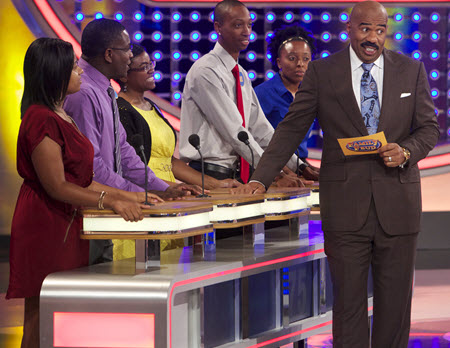Syndication’s Games Are Few but Mighty
The smarter way to stay on top of the multichannel video marketplace. Sign up below.
You are now subscribed
Your newsletter sign-up was successful

The ranks of syndicated game shows remains relatively thin, with only five on the docket in the 2017-18 TV season. But the success of Debmar-Mercury’s Family Feud — revitalized since comedian Steve Harvey joined as host in 2010 — has encouraged producers to search for the next big comedic game hit. So far, that task has proved difficult.
The Game Show Issue:Finding an Escape in TV Fun and Games | Game On for FremantleMedia’s Mullin
Disney-ABC tried to push Who Wants to Be a Millionaire, now in its 16th season in syndication, toward comedy after longtime host Meredith Vieira left to host her own NBCUniversal-produced talk show in 2013. The studio tried out hosts such as Cedric the Entertainer and Terry Crews, but those changes didn’t affect ratings.
Disney-ABC finally returned the show to its more straightforward roots, hiring The Bachelor’s Chris Harrison as host in 2015 and moving the show to Las Vegas from New York City at the start of last season. Those moves have given the show a lift, with Millionaire’s ratings up 10% in viewers, 6% in households and 4% among daytime’s key demographic of women 25-54 this year season-to-date through Oct. 29, according to Nielsen.
To capitalize on the success of Feud, Debmar-Mercury and production partner FremantleMedia North America tried out Celebrity Name Game, hosted by Craig Ferguson, former host of CBS’s The Late Late Show. It was initially intended to be paired with Feud on TV stations, but Tribune, which does not air Feud in many markets, ended up acquiring it. In the end, Celebrity Name Game sputtered and ended its run after last season.
This year, Entertainment Studios rolled out its own comic-driven game show with Funny You Should Ask, hosted by Jon Kelley. In the program, comedians such as Gabriel Iglesias, Sherri Shepherd and Louie Anderson improvise answers to questions while contestants have to guess whether they’re right or wrong. So far, it is averaging a 0.5 in households, season-to-date, and a 0.2 among women 25-54.
Looking ahead, Warner Bros. is shopping a show to be hosted by Jane Lynch that studio sources describe as a comedy, but neither a talk nor game show. It’s being targeted for early-fringe and access time slots, so it could run in competition or be coupled with games and sitcoms in those time periods.
In general, new offerings in access are few. But with a lack of new sitcoms on the docket, studios are looking for non-sitcom ways to help stations freshen up access.
Meanwhile, over a year ago, Family Feud surpassed CBS Television Stations’ longtime leaders Wheel of Fortune and Jeopardy! to become syndication’s top-rated game. For years, it’s also been the top-rated first-run program among women 25-54. But Feud’s numbers are helped by multiple runs on both stations and on cable, while Wheel still relies on single runs. Jeopardy! has double-runs in some markets, but not nearly as many as Feud.
That said, Wheel and Jeopardy!, both produced by Sony Pictures Television, remain potent offerings in syndication after 35 and 34 seasons, respectively. Wheel, syndication’s fourth highest-rated show, averages a 5.8 in households season-to-date, down 3% compared to last year. Jeopardy! is currently the second highest-rated game in syndication and third highest-rated show overall, averaging a 5.9 in households season-to-date, up 4% from last year at this time.
The smarter way to stay on top of the multichannel video marketplace. Sign up below.
Contributing editor Paige Albiniak has been covering the business of television for more than 25 years. She is a longtime contributor to Next TV, Broadcasting + Cable and Multichannel News. She concurrently serves as editorial director for The Global Entertainment Marketing Academy of Arts & Sciences (G.E.M.A.). She has written for such publications as TVNewsCheck, The New York Post, Variety, CBS Watch and more. Albiniak was B+C’s Los Angeles bureau chief from September 2002 to 2004, and an associate editor covering Congress and lobbying for the magazine in Washington, D.C., from January 1997 - September 2002.

